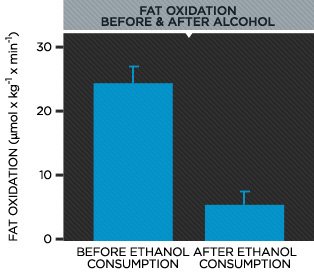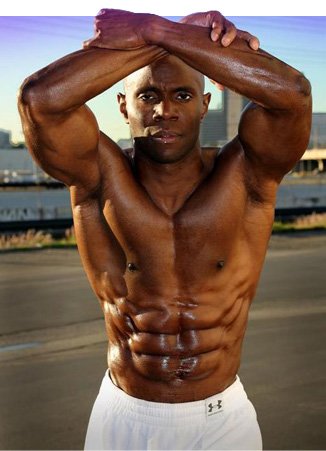by Obi Obadike
I'd really like to meet my fat-loss goals, but I'm worried my nightly glass of wine is going to keep me from getting there. What do you think, Obi? Should I ditch the drink?
We've all seen the guy with the giant belly and thought, "Whoa, that dude drinks a lot of beer!" Many people believe that even a small amount of alcohol will somehow transform their trim waistlines into Death-Star-sized guts. "That's no moon! It's a beer belly!"
While it's probably safe to assume that excess calories will cause excess fat, alcohol doesn't magically pack on the pounds. However, alcohol is calorically dense and can temporarily hinder fat metabolism.
Should you ditch the drink? Pull up a barstool and I'll fill you in!
Alcohol's Effects
As you may know, carbs and protein contain four calories per gram, while fats have nine. Alcohol has seven calories per gram, and is processed differently from the other macronutrients. Alcohol is not an essential nutrient. When ingested, your body typically identifies alcohol as a toxin and works furiously to remove it.

Alcohol has a negative reputation in the fitness community. Part of it stems from the fact that alcohol severely lowers the body's fat oxidation rate. A study published in the American Journal of College of Nutrition1 found that, when men were given two drinks of vodka and sugar-free lemonade, their lipid oxidation dropped by 73 percent!
Lipid oxidation is a measure of how much fat your body is burning. So, even though the cocktails in question were only 90 calories each, they had a huge impact on the drinkers' fat-burning power.
You can see this effect in the figure below, which shows fat oxidation before and after alcohol consumption.

Rather than getting stored as fat, alcohol is converted to a substance called acetate. In the study, subjects had a blood acetate level two and a half times higher than normal. This sharp rise in acetate puts the brakes on fat loss.
Of the 24 grams of alcohol that was consumed in the study, only 3-5 percent was turned to fat. Our body responds to alcohol much as it deals with excess carbs. Alcohol isn't necessarily evil because it's always stored as fat, but because it reduces the amount of fat your body burns for energy.
Furthermore, alcohol can make you want to eat more. According to one study reported in the International Journal of Obesity and Related Metabolic Disorders2, a group of men ate more food when the meal was served with beer or wine rather than a soft drink.
As it turns out, the "drunchies" are real. (Yes, the "drunk munchies.") A 2002 study in Denmark verified that alcohol can work as a potent appetite stimulant.
There's Hope!

Before you go drowning your fat-loss sorrows in more booze, you should know that it is still possible to lose weight while consuming alcohol.
A German study3 assigned 49 overweight subjects to one of two 1,500 calorie diets. The first group's diet included a glass of wine every day, while the other group drank a glass of grape juice.
The wine group actually lost 10.4 pounds, while the juice drinkers lost 8.3 pounds. When used sparingly, alcohol can be a part of a healthy meal plan. In other words, moderation is the key.
Now, I'm not an alcohol drinker myself. The Ripped Dude never gets "ripped," as in two sheets to the wind. Nor am I advocating that you go out and get drunk. I will say, however, that consuming small amounts of alcohol each day—say, a glass of wine with dinner—is probably not going to make you gain fat. It won't even prevent you from reaching your fat-loss goals.
References
- Cordain L, Bryan ED, Melby CL, Smith MJ. (1997). Influence of moderate daily wine consumption on body weight regulation and metabolism in healthy free-living males. Journal of the American College of Nutrition, 16, 134-139.
- Buemann, B., Toubro, S., & Astrup, A. (2002). The effect of wine or beer versus a carbonated soft drink, served at a meal, on ad libitum energy intake. International Journal of Obesity and Related Metabolic Disorders, 26, 1367-1372
- Flechtner-Mors, M., Biesalski, H.K., Jenkinson, C.P., Adler, G., & Ditschuneit, H.H. (2004). Effects of moderate consumption of white wine on weight loss in overweight and obese subjects. International Journal of Obesity and Related Metabolic Disorders, 28, 1420-1426
No comments:
Post a Comment